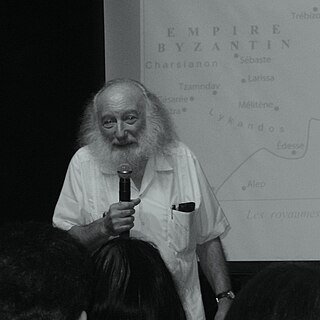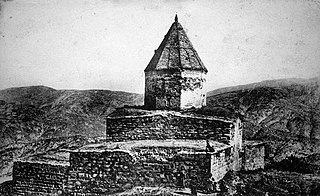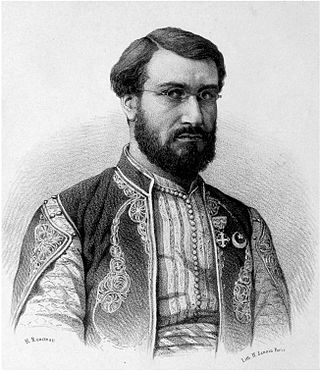Related Research Articles
Justice Commandos of the Armenian Genocide (JCAG) was an Armenian militant organization active from 1975 to 1987.
Hertevin, officially Ekindüzü, is a village in the Pervari District of Siirt Province in Turkey.

The deportation of Armenian intellectuals is conventionally held to mark the beginning of the Armenian genocide. Leaders of the Armenian community in the Ottoman capital of Constantinople, and later other locations, were arrested and moved to two holding centers near Angora. The order to do so was given by Minister of the Interior Talaat Pasha on 24 April 1915. On that night, the first wave of 235 to 270 Armenian intellectuals of Constantinople were arrested. With the adoption of the Tehcir Law on 29 May 1915, these detainees were later relocated within the Ottoman Empire; most of them were ultimately killed. More than 80, such as Vrtanes Papazian, Aram Andonian, and Komitas, survived.
Armenians in France are French citizens of Armenian ancestry. The French Armenian community is, by far, the largest in the European Union and the third largest in the world, after Russia and the United States.

Armen (Claude) Z. Moutafian is a French mathematician and a historian who specializes in Armenian history. He is a Foreign Member of Armenian Academy of Sciences. He is the son of Zareh Mutafian.
Yves Ternon is a French physician and medical historian, as well as an author of historical books about the Jewish Holocaust and the Armenian genocide. He is professor of the history of medicine at University Paris IV Sorbonne. He is also an active member of Doctors Without Borders organization.
Jean-Michel Thierry de Crussol (1916–2011) was a French physician and art historian. His specialities are in Byzantine and Armenian art.

Armenians in Belgium are citizens of Belgium of Armenian ancestry. The exact number of Armenians in the country is unknown, but is unofficially estimated to be about 40,000.
Ayşe Nur Zarakolu was a Turkish author, publisher and human rights advocate. She was co-founder, with her husband Ragıp Zarakolu, of notable Turkish publishing house Belge and, in the 1980s, became the director of book-distribution company Cemmay, the first woman in the nation to hold such a position. Zarakolu's publications brought her into frequent conflict with Turkish press laws; in 1997, The New York Times identified Zarakolu as "one of the most relentless challengers to Turkey's press laws". Issues Zarakolu helped publicize in Turkey include the Armenian genocide and human rights of Kurdish people in Turkey. Imprisoned multiple times for her publications, she was designated a prisoner of conscience by Amnesty International and her legacy continued to face legal challenge in Turkey after her death. She has received multiple awards and honors for her work and the Human Rights Association of Turkey bestows the Ayşe Zarakolu Freedom of Thought prize in her honor.

Khtzkonk Monastery was a monastic ensemble of five Armenian churches built between the seventh and thirteenth centuries in what was then the Armenian Bagratid kingdom. The site is located near the town of Digor, the administrative capital of the Digor District of the Kars Province in Turkey, about 19 kilometres west of the border with Armenia, in a gorge formed by the Digor River.

Horomos, also known as Horomosivank, Ghoshavank, Hochavank or Khosha Vank, is an abandoned and ruined medieval Armenian monastic complex about 15 kilometers northeast of the ruins of Ani in present-day eastern Turkey. With its collection of churches, chapels and tombs, Horomos has been described as one of the most significant spiritual and cultural religious centers in medieval Armenia and one of the largest in all the Christian East.

Raymond Haroutioun Kévorkian is a French Armenian historian. He is a Foreign Member of Armenian National Academy of Sciences. Kevorkian has a PhD in history (1980), and is a professor.

Lyon Armenian Genocide Memorial was erected in 2006 in central Lyon, France, in memory of the victims of the Armenian genocide in the Ottoman Empire in 1915 and the following years.

Aparank Monastery or Aparanq, or Holy Cross Aparank, is an Armenian monastery located in modern-day Turkey, Van province near the city of Bahçesaray. It was found within the borders of the historical Armenian province of Mokk.

Victor Langlois was a French historian, archaeologist, professor, numismatist, and orientalist who specialized in the study of the Middle Ages. Langlois was particularly known for his work on Armenian history and culture. He authored more than thirty books on Armenian history.

Jean-Pierre Mahé is a French orientalist, philologist and historian of Caucasus, and a specialist of Armenian studies.
Gérard Dédéyan is a French professor of medieval history at the Paul Valéry University, Montpellier III, a member of the Armenian National Academy of Sciences and associate member of the Collège de France. He studied Classical Armenian with Frédéric-Armand Feydit.
Claire Mouradian is a French historian of Armenian origin who specializes in the history and geopolitics of Caucasus and, more specifically, in the history of Armenia and Armenian diaspora. She explores in her works inter-ethnic relations in the Caucasus region, migration and the position of minorities.

Anahide Ter Minassian born Anahide Kévonian was a French historian of Armenian origin who specialised in modern Armenian history, particularly the pre- and post-Soviet period of Armenian history, and the Armenian revolutionary movement.
The Armenian National Delegation is a diplomatic mission and an Armenian organization whose objective is to advocate for the claims of the Armenians of Western Armenia between 1912 and 1925. The organization was established by Georges V Soureniants and initially led by the businessman and diplomat Boghos Nubar Pasha until 1921.
References
- Yozgatli kebapçiyan, Sabah, November 8, 1999
- Raffi’nin rüyalari, Hürriyet, November 13, 1999
- Saat 1915’te durdu, Cumhuriyet dergi, November 28, 1999